Three years after the final installment of his ambitious trilogy Infernal Affairs (無間道) hit the big screen, Hong Kong's most sought-after director Andrew Lau (劉偉強) returns to his favored theme of cops and killers in Daisy (愛無間), only this time he has dispensed with a male-dominated plot.
Lau's usual fare of tough-guy action has been augmented in Daisy by the presence of a female protagonist over whose affections a hit man and Interpol agent tussle.
Set entirely in Amsterdam, the film revolves around a young, beautiful street artist named Hye-Young from South Korea (played by Jun Ji-Hyun).
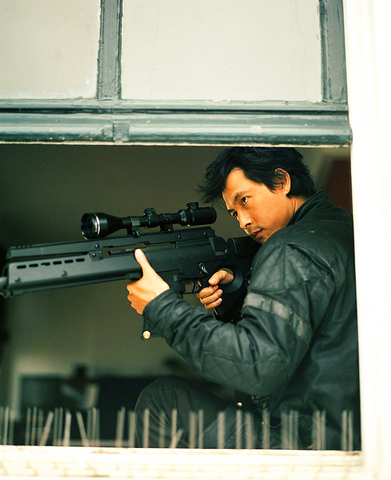
With the purity of an angel, Hye-Young holds out for the man of her dreams who has yet to enter her life.
And low, along comes South Korean assassin Park Yi (played by Jung Woo-Sung) who immediately falls for Hye-Young.
Knowing his soul is tainted with blood, Yi chooses to remain in the shadows and become Hye-Young's self-appointed guardian angle: he leaves a pot of daisies outside her door everyday.
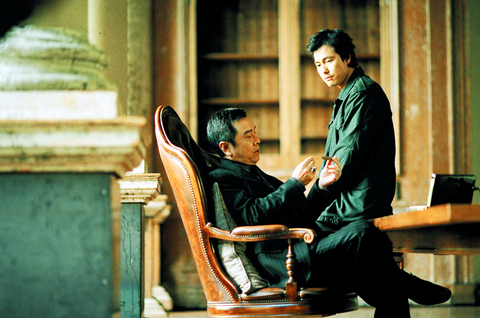
Yi's quiet love turns into agony as he watches Hye-Young fall in love with elite Interpol agent Jeong Woo (played by Lee Sung-Jae) whom she mistakes for her secret admirer.
Fate intervenes when Yi receives orders to dispatch Jeong Woo. The impossibility of the love between the cop, the assassin and the woman becomes apparent when the dark forces of life infiltrate Hye-Young's previously untainted world, leading to bloodshed.
The film tells a Beauty-and-the-Beast story in which the lead woman's love is portrayed as the only path to salvation for men with blood on their hands.
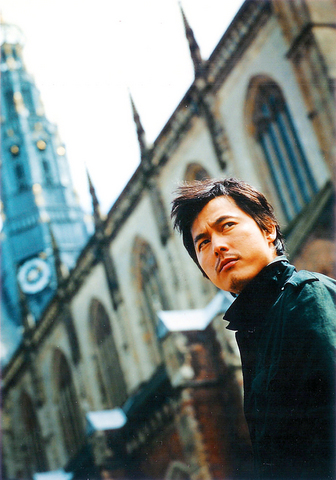
Without degenerating into dull cliches, Daisy is a highly entertaining movie which provides audiences with the chance to momentarily escape the drudgery of routine relationships and indulge in a tragic love fantasy.
A collaboration between Hong Kong and South Korea, Daisy benefits from the cross-cultural perspectives of its crew and production team.
For Daisy, Lau teamed up with renowned action choreographer Dion Lam (

The end result is a film with an engaging plot that is rich in action and technically accomplished. The editing is smooth, while the sharp cinematography of the action scenes stands in stylistic contrast to the sometimes impressionistic colors and lighting of the romantic scenes.
The film also greatly benefits from first-rate actors in the leading roles. The charisma of their Hong Kong counterparts such as Tony Leung (
As international collaborations gain popularity in the film industry, more and more Asian stars and film professionals from different regions are gradually making their marks on the global markets.
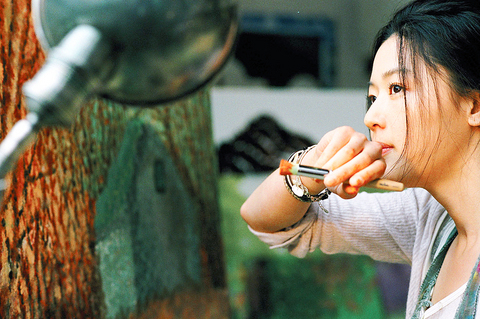
As the maker of several blockbusters, Lau plans a Hollywood debut with The Flock. The time may have come for him to follow in John Woo's (
Daisy (愛無間)
Directed by: Andrew Lau (劉偉強)
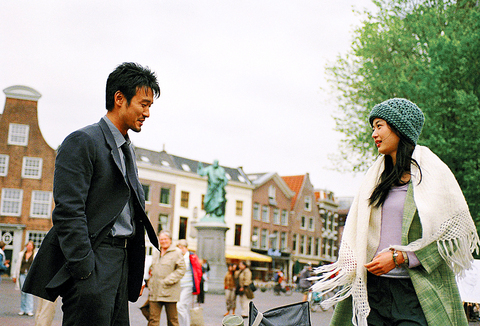
PHOTOS COURTESY OF GROUP POWER WORKSHOP
Starring: Jun Ji-Hyun as Hye-Young, Jung Woo-Sung as Park Yi, Lee Sung-Jae as Jeong Woo
Running time: 96 minutes
Taiwan Release: Today
Language: Korean with English and Chinese
subtitles

One of the biggest sore spots in Taiwan’s historical friendship with the US came in 1979 when US president Jimmy Carter broke off formal diplomatic relations with Taiwan’s Republic of China (ROC) government so that the US could establish relations with the People’s Republic of China (PRC). Taiwan’s derecognition came purely at China’s insistence, and the US took the deal. Retired American diplomat John Tkacik, who for almost decade surrounding that schism, from 1974 to 1982, worked in embassies in Taipei and Beijing and at the Taiwan Desk in Washington DC, recently argued in the Taipei Times that “President Carter’s derecognition

This year will go down in the history books. Taiwan faces enormous turmoil and uncertainty in the coming months. Which political parties are in a good position to handle big changes? All of the main parties are beset with challenges. Taking stock, this column examined the Taiwan People’s Party (TPP) (“Huang Kuo-chang’s choking the life out of the TPP,” May 28, page 12), the Democratic Progressive Party (DPP) (“Challenges amid choppy waters for the DPP,” June 14, page 12) and the Chinese Nationalist Party (KMT) (“KMT struggles to seize opportunities as ‘interesting times’ loom,” June 20, page 11). Times like these can

JUNE 30 to JULY 6 After being routed by the Japanese in the bloody battle of Baguashan (八卦山), Hsu Hsiang (徐驤) and a handful of surviving Hakka fighters sped toward Tainan. There, he would meet with Liu Yung-fu (劉永福), leader of the Black Flag Army who had assumed control of the resisting Republic of Formosa after its president and vice-president fled to China. Hsu, who had been fighting non-stop for over two months from Taoyuan to Changhua, was reportedly injured and exhausted. As the story goes, Liu advised that Hsu take shelter in China to recover and regroup, but Hsu steadfastly

You can tell a lot about a generation from the contents of their cool box: nowadays the barbecue ice bucket is likely to be filled with hard seltzers, non-alcoholic beers and fluorescent BuzzBallz — a particular favorite among Gen Z. Two decades ago, it was WKD, Bacardi Breezers and the odd Smirnoff Ice bobbing in a puddle of melted ice. And while nostalgia may have brought back some alcopops, the new wave of ready-to-drink (RTD) options look and taste noticeably different. It is not just the drinks that have changed, but drinking habits too, driven in part by more health-conscious consumers and